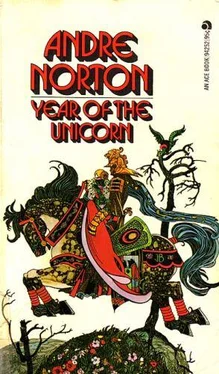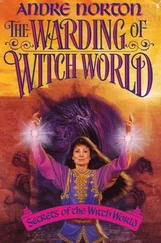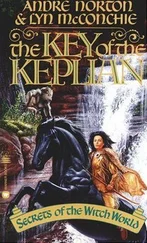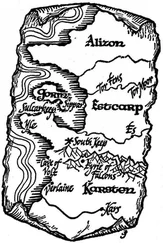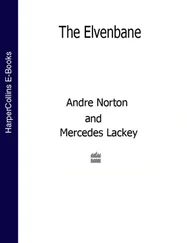“That war which sent us riding into the waste is long since done and gone. There are new rulers in Arvon. But also were forces loosed then which are neither truly good nor ill, but which can be moulded for the service of either. These can be commanded by the Riders working together—”
“Rulers!” I interrupted him. “Herrel, is there no law which runs in Arvon? Can one appeal to no overlord for justice?”
He shook his head. “The Riders are without the law, and you are also an outsider. We have taken no oath-service. They can not deny us Arvon, for that is our birthright and the terms of the treaty have been fulfilled. In time the Riders will take service, with some one of the Seven Lords. Now no man can move against them as long as their targets are of their own company—me—and you, an alien from the Dales. There is nothing for us save what lies here—” he spread out his hands, “or here.” He tapped his forehead.
Out of his saddle bags Herrel brought food and we ate. For a little that revived me and I walked along the stream feeling strength and life rise in me. So I believed that Herrel could not be sure they were draining me to build their Gillan the stronger.
“Have you no kin here, Herrel?” I asked. “You could not always have been a Rider. Were you never a child with a home, mother, father, perhaps brothers?”
He had put aside the cat-crested helm, was kneeling by the brook laving his face with water in his cupped hands.
“Kin? Oh, yes, I suppose I have kin—if time and change have spared them. You have set finger on my difference, Gillan. Just as you are not Dale brood, but were fostered so, I am not wholly Were strain. My mother was of the House of Car Do Prawn—their hall lies to the north—or did. She fell under the love spell of a Rider and came to him across the hills. Her father paid sword ransome to take her back, and I do not know whether that was by her will or no. When she came to child bed her son was accepted as of her blood. Then, when I was very young—I shape changed—perhaps I was angered, or frightened—but it made my inheritance plain to read—I was Rider rather than Redmantle. So they sent me to the Grey Towers. But still was I half blood and so not truly of the Riders either. Thus my father in time liked me as little as did those of Car Do Prawn. On this day I can claim no aid from Redmantle clans.”
“But your mother—”
He shrugged and shook the water drops from his, hand. “Her name I know—the Lady Eldris—and that is all. As for my father,” he stood up, his face averted from me, he was—is—among those who have set this ill upon us. It has humbled his pride that he has only a half-son.”
“Herrel—” I came to him, put my hand into his. And when he would not tighten the grasp then did I, but still he kept his face turned from me, and I did not try to do more than I had done.
“Well and well.” I said at last. “Since we have naught but ourselves, then that must do—” But my words were far lighter than my thoughts and did nothing to dampen my growing fear.
Herrel whistled to the stallion and the horse trotted to him. He put on saddle and bridle and then looked to me, his eyes remote, withdrawn. “It is time to ride.”
We returned to the road. Now it wound through steadily rising dale hills. At last I broke the silence between us to ask:
“You spoke of the Grey Towers. Are they the home of the Riders? Do they return there now?”
“Yes. And it is needful we reach them before they enter the Towers. In the open we have a small chance. To follow them into the Towers is hopeless folly, for there the very stones are steeped in sorcery they can draw upon for aid.”
“How far?”
“We are perhaps half a day behind them. They may send on the women, wait for us—”
“Send on the women! If they send Gillan—”
“Yes!” His interruption and the tone of his voice was enough. I had put into words one of his own sharp fears. “Herrel, can I will myself into the Gillan and so somehow delay them?”
“No! They will be watching her with great care. They would know and when they did—then they would have what they want. This time they would not drive you forth, they would bind you—to become the Gillan they wish.”
There was movement behind a bush some paces ahead.
I noted the horse’s ears a-prick.
“Herrel!” I hardly breathed that.
“I see.” his whispered answer was as faint. “This may be their first move. Hold well your seat.”
Though Herrel gave no signal I could detect, the horse quickened pace. We came even with the bush. There reared out of it such a creature as might have sprung from some legend. Not furred, but scaled, still also in its body shape like unto a giant wolf thing, with a kind of mane of stiffened spines across its head and down its shoulders. At the same time it reached for us, horse and riders, Herrel kicked out, striking aside its taloned paw. The thing squalled.
Scales melted into skin. Now I saw not a reptilian monster but a small brown creature a third its size raising a head which was a travesty of human with eyes in it which held no intelligence, only brute anger and ferocity. It was worse in a way than the illusion it—or others—had used to cloth it. I cried out, but I did not move in the saddle.
Herrel flailed down at the thing, using his sword flat bladed to beat, rather than edged to cut. It crouched back, slavering its rage. He shouted words which cowered it more than his blows, and it scuttled back into the bush.
“Wait.” Herrel slipped from his horse. Sword in hand, he went towards the brush in which the brown thing had vanished. Just before this bolt hole he drove the sword point down into the earth and rested his two hands upon its hilt, right over-lapping left as he spoke again in that other tongue, this time sing-songing the words until they made the pattern of a chant. Having so done, he pulled free his sword and, using the tip as a writing tool, he drew symbols in the dust of the road behind us and along both sides for a space of several feet.
“What was it?” I asked as he returned to me.
“A wenzal. One alone is no great danger. But when one sniffs, more follow, and in a pack they are no foe to be smiled upon.”
“Those marks—” I pointed to those he had traced in the dust.
“To murk our trail. That scout will seek out his kind.
They will up the hunt.”
“Are they of those whom you spoke—neither good nor ill, but able tool to either?”
I heard him laugh. “You listen well, my lady. No, the wenzal is wholly ill, but it is also cowardly, and it can be routed by knowing the right weapon with which to face it. Usually it comes not down from its high places. Mayhap it was intended for a guardian thing, made to be a lock upon our borders. If so, it was marred in the making, for it turns against all comers.”
“Then it might be here only by chance—” I ventured.
Again I heard his laughter, but this time with less amusement in it. “This far from the border? No, the wenzal is not that great a traveller. And, as I said, it is a coward, keeping well away from Arvon’s core lands. If a pack runs here now, they have been summoned.
“They must know that you have a defence against them—”
“Against one wenzal, or even five perhaps—against a full pack that is another matter. These creatures gain courage from numbers and their rage feeds in proportion to their company. When that rage reaches a certain point, then they care for nothing—save the overwhelming of the enemy. And stopping them at that moment is far beyond a single sword or any small sorcery I possess.”
“There is also this.” he added as he took up the reins once again. “Each small delay works to the Riders’ favour.” Then he fell silent. Perhaps he strove to see with the mind’s eyes what new plague they could send upon us. But I had other thoughts.
Читать дальше
